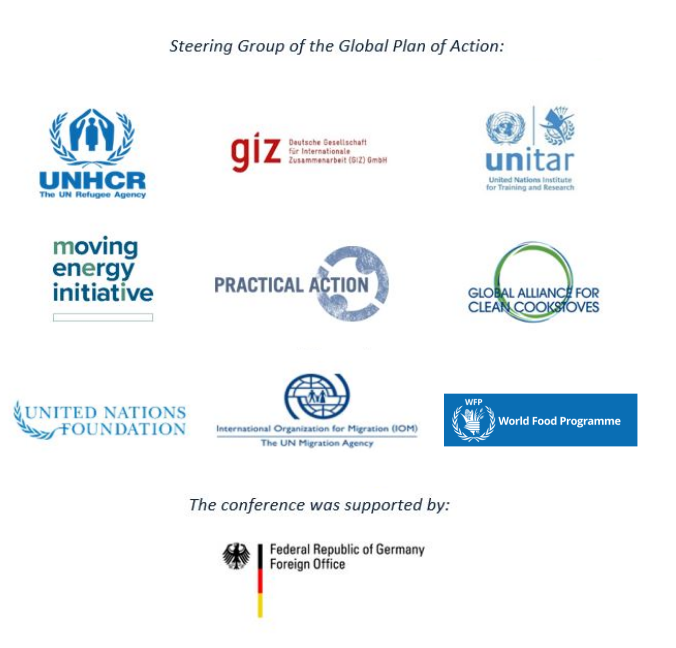Energy for Displaced People - A Global Plan of Action
Conference Overview
In January 2018 in Berlin, UN agencies, donors, civil society groups and representatives from the private sector came together to take the first steps to develop a Global Plan of Action for Sustainable Energy Solutions in Situations of Displacement to ensure that displaced populations are fully included in the achievement of Sustainable Development Goal 7 (SDG7). The vision is that “every person affected by conflict or natural disaster has access to affordable, reliable, sustainable and modern energy services by 2030". The conference was hosted by GIZ, Berlin and supported by the Foreign Office of the Federal Republic of Germany.
Background Information
While achieving SDG 7 relies on countries’ policies, plans and programmes, and will be led by countries for their citizens, displaced people are not an explicit part of these plans and tend to be neglected. Often, they live in isolated areas or informal settlements along-side communities who are sometimes left-behind in development planning and less likely to be a priority. Refugees, for example, are non-nationals and if they are able to return to their homes, they often remain in fragile and post conflict or disaster situations. Therefore, the participants called on all stakeholders for collective efforts to support achieving SDG 7 for displaced people. The foundations of these efforts will be the Global Plan of Action for Sustainable Energy Solutions in Situations of Displacement (GPA), which will be launched during the High-Level Political Forum in July 2018 (HLPF).
Sustainable energy is also vital in supporting the implementation of the Comprehensive Refugee Response Framework and underpins many of the specific measures being developed by the Global Compact on Refugees and the Global Compact on Migration: access to energy is indispensable in delivering better health and education services as well as livelihood opportunities for displaced people and host communities while also having the potential to address the root causes of displacement.
For more background information click here.
Brief Conference Outcomes
At the two-day conference, 120 delegates agreed to collaborate in five working groups:
- Planning and Coordination – Emergency and Protracted Crisis
- Policy, Advocacy and Host Country Resilience - Supporting National and Local Development Plans
- Innovative Finance: Public, Private and Public-private Models of Delivery for Sustainability
- Technical Expertise, Capacity Building and Training
- Data, Evidence, Monitoring and Reporting
The conference participants agreed to:
- Improve energy practice and policy in displacement settings. This will result in reduced energy costs and associated environmental pressures in host countries, and improved resilience of communities and host countries.
- Involve displaced people and host communities in the new Global Plan of Action to reflect their priorities and needs. This will require coordinated strategies and effective communication across all stakeholders for long-term sustainable energy access.
- Bolster finance for sustainable infrastructure and renewable energy investments. This will include delivering innovative financing methods for the sector.
- Utilize the skills and capacities of displaced people and ensure they have an active role for future energy interventions. This includes creating jobs and livelihood opportunities for both displaced people and host communities where possible.
- Harmonize and standardize high-quality, usable data and evidence across the sector for monitoring, learning and evaluation. This will ensure decision-makers have access to the information they need to make sustainable energy choices and report effectively change.
For detailed outcomes see here.
Steering Group of the Global Plan of Action
To conduct these efforts, a steering group of leading organizations has been established to support humanitarian organizations and their partners in delivering priorities on gender and diversity, protection, gender-based violence (GBV), and environmental sustainability – all through the lens of improved and sustainable energy provision.
The Global Plan of Action steering group welcomes organizations who were unable to attend the conference into the community, and is happy to brief anyone on the progress of the plan. Please indicate here if you would like to receive regular updates on the Global Plan of Action progress.
Next steps
The GPA will be presented at the following events (as of 14 February 2018):
- 21-23 February: SDG 7 Review Conference, Bangkok
- 12 April: The SET4FOOD final conference, Milan
- 2-3 May: Sustainable Energy 4All Annual Forum, Lisbon
- June: public consultation process until June 10
- Launch at the High-Level Political Forum (9-18 July, Ministerial Segment between 16-18) in New York.
- until end of 2018 develop Work Plan for the next 2-3 years
- Set up of secretariat and support structure
Further Information on the Global Plan of Action
For more information or if you would like to be involved in the working groups, please contact energy@unitar.org. If you would like to be notified about major developments relating to the Global Plan of Action, please sign up for the SAFE mailing list. For community discussions, we have set up a discussion forum on ENERGYCoP – a dedicated community of practice for stakeholders engaged in humanitarian energy.
The organisations leading the development of the Global Action Plan are UNHCR, UNITAR, IOM, GIZ, The Moving Energy Initiative, Practical Action, the Global Alliance for Clean Cookstoves, and the UN Foundation. The Global Action Plan Conference organisers thank the Federal Foreign Office of Germany for their support for this initiative.
- Background, Visions and Outcomes
- Background Paper: Planning and Coordination – Emergency and Protracted Crises
- Background Paper: Policy, Advocacy and Host Country Resilience - Supporting National and Local Development Plans
- Background Paper: Finance for Energy in Refugee Settings - Moving from ‘Doing Good’ to ‘Doing Well’
- Background Paper: Technical Expertise, Capacity Building and Training
- Background Paper: Data, Evidence, Monitoring and Reporting
- ENERGYCoP
- UNITAR
- Global Plan of Action - Framework for Action
- Programme Overview
- Press Release following the launch of the Global Plan of Action




















